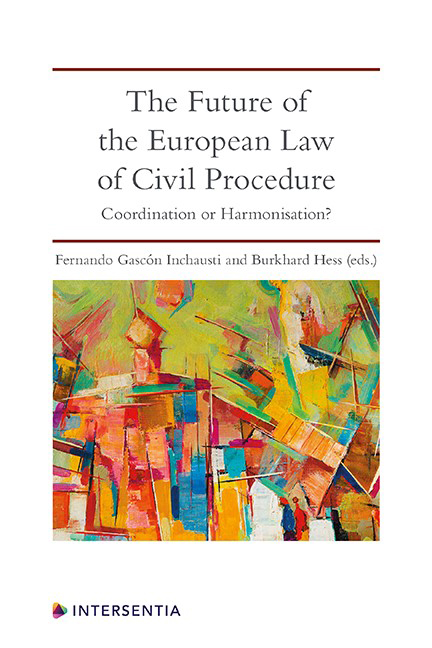Book contents
- Frontmatter
- Contents
- List of Cases
- List of Authors
- Introduction
- PART I METHODOLOGICAL APPROACHES
- PART II THE CURRENT SITUATION: VERTICAL AND HORIZONTAL HARMONISATION
- PART III CURRENT INITIATIVES FOR FURTHER HARMONISATION: The ELI/UNIDROIT Project
- The 2017 Directive Proposal on Common Minimum Standards of Civil Procedure
- Index
- ABOUT THE EDITORS
Have the EU Regulations on Judicial Cooperation Fostered Harmonisation of National Procedures?
Published online by Cambridge University Press: 23 July 2020
- Frontmatter
- Contents
- List of Cases
- List of Authors
- Introduction
- PART I METHODOLOGICAL APPROACHES
- PART II THE CURRENT SITUATION: VERTICAL AND HORIZONTAL HARMONISATION
- PART III CURRENT INITIATIVES FOR FURTHER HARMONISATION: The ELI/UNIDROIT Project
- The 2017 Directive Proposal on Common Minimum Standards of Civil Procedure
- Index
- ABOUT THE EDITORS
Summary
NATIONAL DIVERSITY, MUTUAL RECOGNITION AND HORIZONTAL HARMONISATION
Any general study on the future of civil procedure – and more specifically on harmonisation – in the European Union should start by analysing the current situation. How close to each other are national regulations of civil procedure within the EU Member States really? The answer is not easy, since it depends on where we put the focus and what we are comparing. The systems of civil procedure of the Scandinavian countries, for instance, are quite close to one another and, therefore, one could say that they are sufficiently harmonised. Similar conclusions could be reached if we compared England and Ireland, or France and Luxembourg. But if one looks at the general picture, the results are quite the opposite: national procedural systems are still very different from each other, as can be deduced from a broad study commissioned by the European Commission and performed under the lead of the Max Planck Institute Luxembourg for Procedural Law (the so-called “Luxembourg Study on European Procedural Law“).
The differences may not affect the basic and structural principles of civil procedure, such as access to courts, fairness of proceedings and equality of arms. But even the conception of overriding principles, such as the principles of party autonomy and party disposition may vary from one country to another. And, of course, differences grow bigger the more one scrutinises procedural technicalities, i.e., the precise way national legislators have considered it suitable to set the balance between the rights of plaintiff s and defendants or the roles of parties, lawyers and judges. Who serves the documents instituting the proceedings and how; who enforces a judgment or equivalent enforceable document and how; how strict are the rules on preclusion and timely production of documents; the need to be represented by a lawyer or not; the duty to pay upfront court fees, and of what amount; those, and many others, are issues that national legislation addresses in very heterogeneous manners. As a result,
a citizen or a resident of an EU Member State wishing to commence litigation in another EU Member State will not be able to expect to approach courts and authorities in any Member State as easily as in their own.
- Type
- Chapter
- Information
- The Future of the European Law of Civil ProcedureCoordination or Harmonisation?, pp. 91 - 110Publisher: IntersentiaPrint publication year: 2020
- 1
- Cited by



